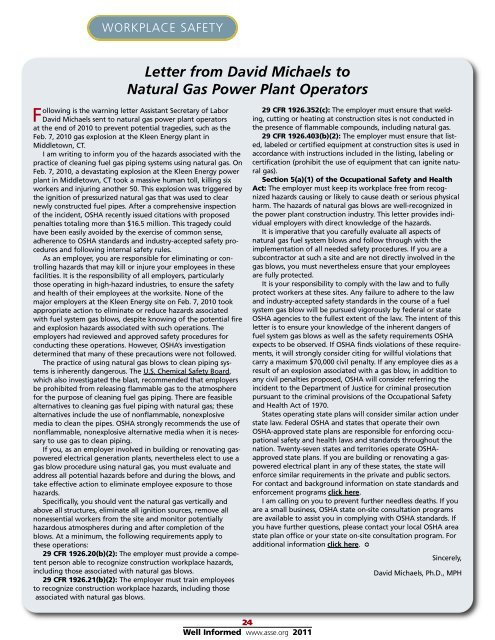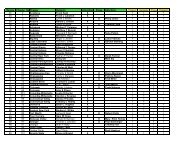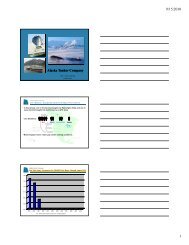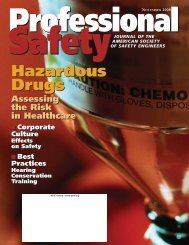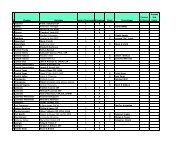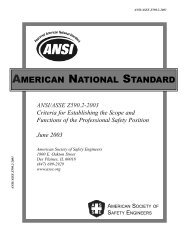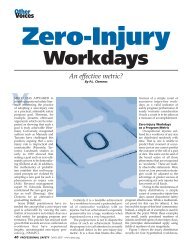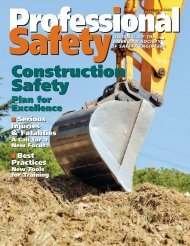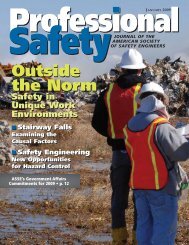OSHA's Flame-Resistant Clothing Policy - ASSE Members
OSHA's Flame-Resistant Clothing Policy - ASSE Members
OSHA's Flame-Resistant Clothing Policy - ASSE Members
You also want an ePaper? Increase the reach of your titles
YUMPU automatically turns print PDFs into web optimized ePapers that Google loves.
WORKPLACE SAFETYLetter from David Michaels toNatural Gas Power Plant OperatorsFollowing is the warning letter Assistant Secretary of LaborDavid Michaels sent to natural gas power plant operatorsat the end of 2010 to prevent potential tragedies, such as theFeb. 7, 2010 gas explosion at the Kleen Energy plant inMiddletown, CT.I am writing to inform you of the hazards associated with thepractice of cleaning fuel gas piping systems using natural gas. OnFeb. 7, 2010, a devastating explosion at the Kleen Energy powerplant in Middletown, CT took a massive human toll, killing sixworkers and injuring another 50. This explosion was triggered bythe ignition of pressurized natural gas that was used to clearnewly constructed fuel pipes. After a comprehensive inspectionof the incident, OSHA recently issued citations with proposedpenalties totaling more than $16.5 million. This tragedy couldhave been easily avoided by the exercise of common sense,adherence to OSHA standards and industry-accepted safety proceduresand following internal safety rules.As an employer, you are responsible for eliminating or controllinghazards that may kill or injure your employees in thesefacilities. It is the responsibility of all employers, particularlythose operating in high-hazard industries, to ensure the safetyand health of their employees at the worksite. None of themajor employers at the Kleen Energy site on Feb. 7, 2010 tookappropriate action to eliminate or reduce hazards associatedwith fuel system gas blows, despite knowing of the potential fireand explosion hazards associated with such operations. Theemployers had reviewed and approved safety procedures forconducting these operations. However, OSHA’s investigationdetermined that many of these precautions were not followed.The practice of using natural gas blows to clean piping systemsis inherently dangerous. The U.S. Chemical Safety Board,which also investigated the blast, recommended that employersbe prohibited from releasing flammable gas to the atmospherefor the purpose of cleaning fuel gas piping. There are feasiblealternatives to cleaning gas fuel piping with natural gas; thesealternatives include the use of nonflammable, nonexplosivemedia to clean the pipes. OSHA strongly recommends the use ofnonflammable, nonexplosive alternative media when it is necessaryto use gas to clean piping.If you, as an employer involved in building or renovating gaspoweredelectrical generation plants, nevertheless elect to use agas blow procedure using natural gas, you must evaluate andaddress all potential hazards before and during the blows, andtake effective action to eliminate employee exposure to thosehazards.Specifically, you should vent the natural gas vertically andabove all structures, eliminate all ignition sources, remove allnonessential workers from the site and monitor potentiallyhazardous atmospheres during and after completion of theblows. At a minimum, the following requirements apply tothese operations:29 CFR 1926.20(b)(2): The employer must provide a competentperson able to recognize construction workplace hazards,including those associated with natural gas blows.29 CFR 1926.21(b)(2): The employer must train employeesto recognize construction workplace hazards, including thoseassociated with natural gas blows.29 CFR 1926.352(c): The employer must ensure that welding,cutting or heating at construction sites is not conducted inthe presence of flammable compounds, including natural gas.29 CFR 1926.403(b)(2): The employer must ensure that listed,labeled or certified equipment at construction sites is used inaccordance with instructions included in the listing, labeling orcertification (prohibit the use of equipment that can ignite naturalgas).Section 5(a)(1) of the Occupational Safety and HealthAct: The employer must keep its workplace free from recognizedhazards causing or likely to cause death or serious physicalharm. The hazards of natural gas blows are well-recognized inthe power plant construction industry. This letter provides individualemployers with direct knowledge of the hazards.It is imperative that you carefully evaluate all aspects ofnatural gas fuel system blows and follow through with theimplementation of all needed safety procedures. If you are asubcontractor at such a site and are not directly involved in thegas blows, you must nevertheless ensure that your employeesare fully protected.It is your responsibility to comply with the law and to fullyprotect workers at these sites. Any failure to adhere to the lawand industry-accepted safety standards in the course of a fuelsystem gas blow will be pursued vigorously by federal or stateOSHA agencies to the fullest extent of the law. The intent of thisletter is to ensure your knowledge of the inherent dangers offuel system gas blows as well as the safety requirements OSHAexpects to be observed. If OSHA finds violations of these requirements,it will strongly consider citing for willful violations thatcarry a maximum $70,000 civil penalty. If any employee dies as aresult of an explosion associated with a gas blow, in addition toany civil penalties proposed, OSHA will consider referring theincident to the Department of Justice for criminal prosecutionpursuant to the criminal provisions of the Occupational Safetyand Health Act of 1970.States operating state plans will consider similar action understate law. Federal OSHA and states that operate their ownOSHA-approved state plans are responsible for enforcing occupationalsafety and health laws and standards throughout thenation. Twenty-seven states and territories operate OSHAapprovedstate plans. If you are building or renovating a gaspoweredelectrical plant in any of these states, the state willenforce similar requirements in the private and public sectors.For contact and background information on state standards andenforcement programs click here.I am calling on you to prevent further needless deaths. If youare a small business, OSHA state on-site consultation programsare available to assist you in complying with OSHA standards. Ifyou have further questions, please contact your local OSHA areastate plan office or your state on-site consultation program. Foradditional information click here. Sincerely,David Michaels, Ph.D., MPH24Well Informed www.asse.org 2011


